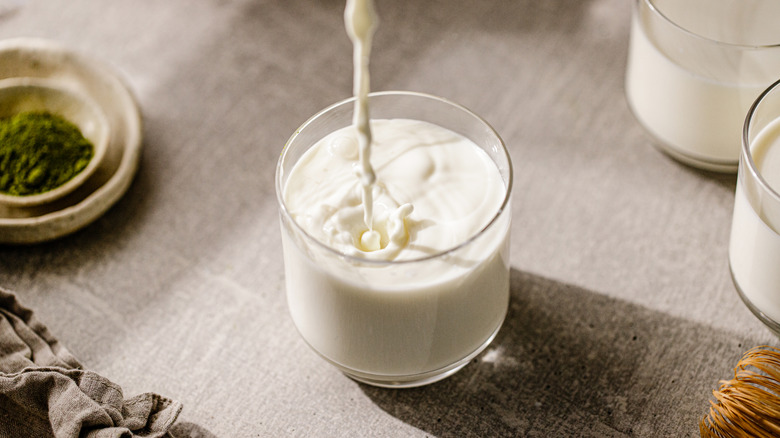When You Stop Drinking Milk, This Is What Happens To Your Early Death Risk
Milk might have been your staple drink growing up, especially when you added a little (or a lot) of chocolate syrup. The calcium in milk is great for growing children to help build strong bones, and milk also provides high-quality protein, potassium, and vitamins A, D, and B. As you grow older, you might have stopped drinking milk and opted for more adult beverages.
Yet drinking milk every day can continue to improve your health as you age. You'll still need calcium for your bones to protect against osteoporosis. Calcium and vitamin D both might reduce your risk of certain types of cancer. The potassium in milk balances the sodium in your blood to help reduce blood pressure. However, milk also has cholesterol and saturated fat, so you might think about giving up milk to protect your heart. Some people avoid milk because it might have hormones and antibiotics that could impact their health. If you stop drinking milk, you could reduce your early death risk, depending on the type of milk you choose. However, it's a little complicated.
High-fat milk could increase your early death risk
A 2021 meta-analysis in Critical Reviews in Food Science and Nutrition pulled together the results of several studies looking at the difference between whole milk and low-fat milk on mortality risk. Drinking whole milk can increase your risk of death by 15%, and it's also linked with a higher risk of dying of cardiovascular disease and cancer. However, consuming more dairy overall can lower your risk of cardiovascular disease.
Drinking low-fat milk can lower your risk of early death by 22% compared to drinking whole milk, according to a 2021 study in Clinical Nutrition. This study, based on research involving almost 30,000 people, found that low-fat milk can reduce your risk of heart-related death by 33%. People who drank whole milk had a 27% lower risk of death.
Interestingly, some studies have found that drinking milk has little effect on your risk of early death, regardless of the milk's fat content. A 2016 meta-analysis in BMC Public Health combined the results of 21 studies and determined that milk doesn't increase or reduce your risk of death from any cause.
Saturated fat is complicated
Still, don't dump out your whole-fat milk and yogurt. According to a 2020 systematic review in Critical Reviews in Food Science and Nutrition, the saturated fat in dairy might be a little more protective of your heart than other sources of saturated fat. Consuming more dairy could increase your HDL cholesterol while reducing total cholesterol and waist circumference. However, you might see a slight increase in your LDL cholesterol and triglycerides with dairy.
In a 2020 review, the Journal of the American College of Cardiology took a closer look at the effect of saturated fats on your health. Saturated fats can increase your LDL cholesterol, but the size of the particles can make a difference in your health risk. Saturated fats increase larger LDL particles that don't affect your risk of cardiovascular disease. While the U.S. Dietary Guidelines still recommend keeping your daily intake of saturated fat to 10% of your total calories, whole-fat dairy, dark chocolate, and unprocessed meat don't increase your risk of diabetes or cardiovascular disease.



